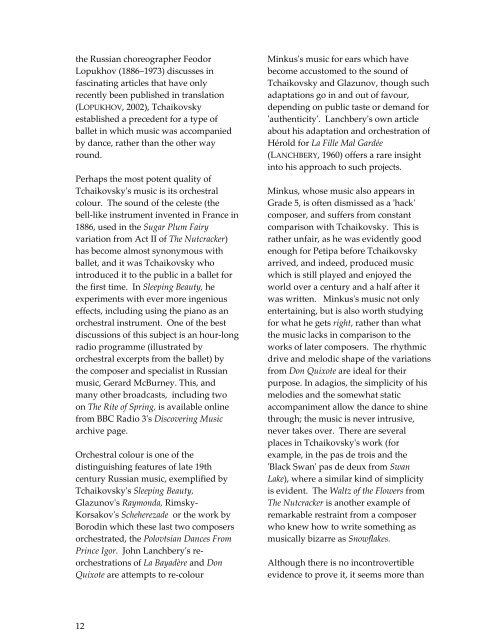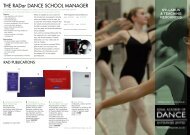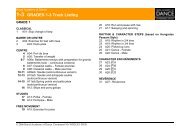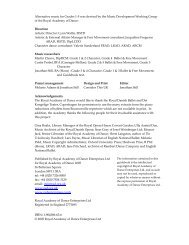to download the guide book in - Royal Academy of Dance Enterprises
to download the guide book in - Royal Academy of Dance Enterprises
to download the guide book in - Royal Academy of Dance Enterprises
Create successful ePaper yourself
Turn your PDF publications into a flip-book with our unique Google optimized e-Paper software.
<strong>the</strong> Russian choreographer Feodor<br />
Lopukhov (1886–1973) discusses <strong>in</strong><br />
fasc<strong>in</strong>at<strong>in</strong>g articles that have only<br />
recently been published <strong>in</strong> translation<br />
(LOPUKHOV, 2002), Tchaikovsky<br />
established a precedent for a type <strong>of</strong><br />
ballet <strong>in</strong> which music was accompanied<br />
by dance, ra<strong>the</strong>r than <strong>the</strong> o<strong>the</strong>r way<br />
round.<br />
Perhaps <strong>the</strong> most potent quality <strong>of</strong><br />
Tchaikovskyʹs music is its orchestral<br />
colour. The sound <strong>of</strong> <strong>the</strong> celeste (<strong>the</strong><br />
bell‐like <strong>in</strong>strument <strong>in</strong>vented <strong>in</strong> France <strong>in</strong><br />
1886, used <strong>in</strong> <strong>the</strong> Sugar Plum Fairy<br />
variation from Act II <strong>of</strong> The Nutcracker)<br />
has become almost synonymous with<br />
ballet, and it was Tchaikovsky who<br />
<strong>in</strong>troduced it <strong>to</strong> <strong>the</strong> public <strong>in</strong> a ballet for<br />
<strong>the</strong> first time. In Sleep<strong>in</strong>g Beauty, he<br />
experiments with ever more <strong>in</strong>genious<br />
effects, <strong>in</strong>clud<strong>in</strong>g us<strong>in</strong>g <strong>the</strong> piano as an<br />
orchestral <strong>in</strong>strument. One <strong>of</strong> <strong>the</strong> best<br />
discussions <strong>of</strong> this subject is an hour‐long<br />
radio programme (illustrated by<br />
orchestral excerpts from <strong>the</strong> ballet) by<br />
<strong>the</strong> composer and specialist <strong>in</strong> Russian<br />
music, Gerard McBurney. This, and<br />
many o<strong>the</strong>r broadcasts, <strong>in</strong>clud<strong>in</strong>g two<br />
on The Rite <strong>of</strong> Spr<strong>in</strong>g, is available onl<strong>in</strong>e<br />
from BBC Radio 3ʹs Discover<strong>in</strong>g Music<br />
archive page.<br />
Orchestral colour is one <strong>of</strong> <strong>the</strong><br />
dist<strong>in</strong>guish<strong>in</strong>g features <strong>of</strong> late 19th<br />
century Russian music, exemplified by<br />
Tchaikovskyʹs Sleep<strong>in</strong>g Beauty,<br />
Glazunovʹs Raymonda, Rimsky‐<br />
Korsakovʹs Scheherezade or <strong>the</strong> work by<br />
Borod<strong>in</strong> which <strong>the</strong>se last two composers<br />
orchestrated, <strong>the</strong> Polovtsian <strong>Dance</strong>s From<br />
Pr<strong>in</strong>ce Igor. John Lanchberyʹs re‐<br />
orchestrations <strong>of</strong> La Bayadère and Don<br />
Quixote are attempts <strong>to</strong> re‐colour<br />
12<br />
M<strong>in</strong>kusʹs music for ears which have<br />
become accus<strong>to</strong>med <strong>to</strong> <strong>the</strong> sound <strong>of</strong><br />
Tchaikovsky and Glazunov, though such<br />
adaptations go <strong>in</strong> and out <strong>of</strong> favour,<br />
depend<strong>in</strong>g on public taste or demand for<br />
ʹau<strong>the</strong>nticityʹ. Lanchberyʹs own article<br />
about his adaptation and orchestration <strong>of</strong><br />
Hérold for La Fille Mal Gardée<br />
(LANCHBERY, 1960) <strong>of</strong>fers a rare <strong>in</strong>sight<br />
<strong>in</strong><strong>to</strong> his approach <strong>to</strong> such projects.<br />
M<strong>in</strong>kus, whose music also appears <strong>in</strong><br />
Grade 5, is <strong>of</strong>ten dismissed as a ʹhackʹ<br />
composer, and suffers from constant<br />
comparison with Tchaikovsky. This is<br />
ra<strong>the</strong>r unfair, as he was evidently good<br />
enough for Petipa before Tchaikovsky<br />
arrived, and <strong>in</strong>deed, produced music<br />
which is still played and enjoyed <strong>the</strong><br />
world over a century and a half after it<br />
was written. M<strong>in</strong>kusʹs music not only<br />
enterta<strong>in</strong><strong>in</strong>g, but is also worth study<strong>in</strong>g<br />
for what he gets right, ra<strong>the</strong>r than what<br />
<strong>the</strong> music lacks <strong>in</strong> comparison <strong>to</strong> <strong>the</strong><br />
works <strong>of</strong> later composers. The rhythmic<br />
drive and melodic shape <strong>of</strong> <strong>the</strong> variations<br />
from Don Quixote are ideal for <strong>the</strong>ir<br />
purpose. In adagios, <strong>the</strong> simplicity <strong>of</strong> his<br />
melodies and <strong>the</strong> somewhat static<br />
accompaniment allow <strong>the</strong> dance <strong>to</strong> sh<strong>in</strong>e<br />
through; <strong>the</strong> music is never <strong>in</strong>trusive,<br />
never takes over. There are several<br />
places <strong>in</strong> Tchaikovskyʹs work (for<br />
example, <strong>in</strong> <strong>the</strong> pas de trois and <strong>the</strong><br />
ʹBlack Swanʹ pas de deux from Swan<br />
Lake), where a similar k<strong>in</strong>d <strong>of</strong> simplicity<br />
is evident. The Waltz <strong>of</strong> <strong>the</strong> Flowers from<br />
The Nutcracker is ano<strong>the</strong>r example <strong>of</strong><br />
remarkable restra<strong>in</strong>t from a composer<br />
who knew how <strong>to</strong> write someth<strong>in</strong>g as<br />
musically bizarre as Snowflakes.<br />
Although <strong>the</strong>re is no <strong>in</strong>controvertible<br />
evidence <strong>to</strong> prove it, it seems more than











